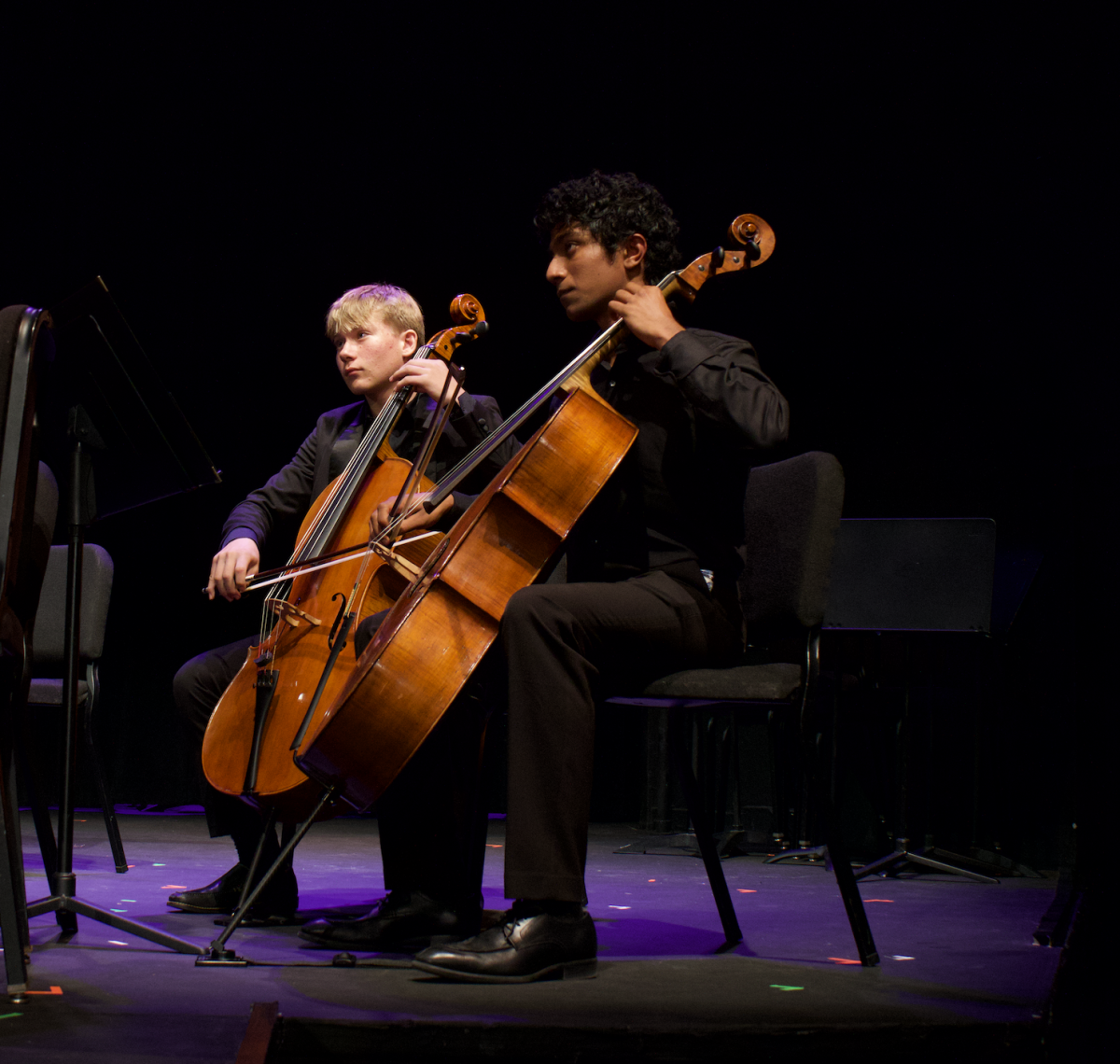Every Tuesday, Wednesday and Thursday since Sept. 5, the sound of actors’ feet moving swiftly across the floor as they dance the Charleston and singers harmonizing floats out of Rugby Theater, the drama lab and the dance studio.
According to Performing Arts Department Head Rees Pugh, “Cabaret” presents the young actors in the Harvard-Westlake production of the musicals with the challenge of having to portray characters much older than them living in Weimar, Germany.
However, Pugh said that this challenge is best overcome when actors use their imaginations.
“We are asking young people to play older people, people hopefully without the kind of personal tragedies and devastations in their lives to play characters who’ve experienced those kinds of things,” Pugh said. “The spirit of play, and of pretend, and full immersion of pretending should allow people the freedom to explore what feeling those feelings are like.”
Pugh added that even though “Cabaret” deals with mature themes such as substance abuse, sexuality, politics and prejudice, it is ultimately a story about the human experience, giving students a way to connect to the characters they play.

“We can all imagine what it is to fall in love,” Pugh said. “We can all imagine what it is to have our hearts broken. We can imagine what it is to be pushed around, to be marginalized. Then, we can ‘extrapolate’ how that feels to us in our lives and imagine that on a hundred-fold scale.”
Alec Davila ’20 said that to portray his character, Schultz, a middle-aged Jewish widower, he played off of Schultz’s optimism to make up for not having experiences similar to his character’s.
“It’s definitely hard to relate to problems of that magnitude,” Davila said. “[Schultz] stays optimistic throughout the whole show, and it’s never seen that he’s defeated. So, I never really take into account showing that I have problems when I’m playing the character.”
Davila said that Schultz’s positivity has taught him to not assume a worst case scenario during times of political strife, and to stay balanced in his approach.
“It’s just a reminder to stay optimistic throughout all of [the struggles one may face], that there’s always a bright side,” Davila said. “I definitely think it has its ups and downs. You have to be smart about it. You have to analyze it. Because [Schultz] is being so optimistic, he’s refusing to look into it and learn about what’s happening to keep himself safe.”
Davila added that he sees Schultz as more of a cautionary tale in that he has learned more about approaching politics and social issues from what Schultz chooses not to do than he has from what Schultz actually does.
“If you were to see a government that was about to take office, persecuting against a specific race or gender, don’t look at it and say, ‘Maybe someone else will do something about it. There’s not a lot that I can do,’” Davila said. “There’s always something that you can do. I feel like that’s something that Schultz misses out on.”

Michael Gaven ’18, who plays Cliff Bradshaw, an American author living in Berlin, said that his character also takes an optimistic approach to the world he lives in, but unlike Schultz, Cliff is more active and tries to help those around him.
“Although he is really gullible, naive and kind and just tries to be nice to everyone, he does know about what is going on in the world around him,” Gaven said. “He is the one who really realizes that the Nazis are rising to power.”
To better understand his character, Gaven said he has reflected on his own experiences of loneliness and curiosity.
“It’s really just about tapping into the emotional struggles I have had with my life,” Gaven said. “I am playing a character who is completely by himself in a whole new world he has never been to before. But one thing is that he is fascinated by many things around him. It’s a combination of everything between being alone and happily looking for a new adventure.”
Gaven said his character’s story presents the message of cherishing those around you during times of societal tumult. He said this is an important idea especially for young adults, who are entering an age where they are increasingly affected by and aware of current events.
“One of my main goals when portraying his role is to get people to see how much he cherishes the relationships he is quickly making in the show,” Gaven said. “It really just goes to show that bad things are going to happen one way or another, but with a little help from friends, with little pockets of positivity, you just keep your head up and keep working to solve problems.”
Jake Schroeder ’20, plays the Master of Ceremonies (Emcee), the host of the cabaret in which the show takes place and the liaison between the characters and the audience. Schroeder said that because his character is more open to interpretation, he has less of a problem with relating to the character’s struggles.
However, he said he has been doing a lot of research and recalling conversations he had with Holocaust survivors in order to better understand the world the characters of “Cabaret” live in.
“I went to a Jewish elementary school, and I learned a lot about the Holocaust and the hardships during World War II,” Schroeder said. “A lot of my friends from that school have relatives that are survivors, and at my elementary school they had holocaust survivors come and tell us their stories. Drawing from both that and my research online, I was able to kind of get background on where people were coming from.”

Schroeder said he believes that his character, who he feels represents political apathy, has taught him the importance of getting involved.
“I think the Emcee is very obsessed with himself, so obsessed with himself to a point where he doesn’t care about everything that is happening, especially with what’s happening with World War II and the rise of the Nazis,” Schroeder said. “This character has just helped inspire me to do something rather than sitting here.”
Charlotte Weinman ’18 said her character, Sally Bowles, a performer from the cabaret who ends up living with Cliff, also represents political indifference. She added that Sally’s apathy has taught her the importance of taking advantage of the freedoms one has access to while living in a democracy.
“In a place that’s democratic like America, it’s sort of your responsibility to enact change and to take advantage of that kind of system,” Weinman said. “It’s interesting to think about that kind of apathy as someone who’s about to register to vote. If Sally was living in America today, and she was turning 18, she probably wouldn’t even register. That has been a motivating factor for me to register.”
Weinman said her character’s need to create a persona has similarities to the way teenagers often feel obligated to present themselves in a certain fashion online, another issue affecting young adults today.
“I think Sally is the kind of person who wants as many opinions on her as possible,” Weinman said. “She’s not necessarily trying to be palatable to everybody she meets but trying to shock someone or appeal to someone. Even in social media, in the way that we try to curate our personalities online, it’s not necessarily to try to be palatable, but it’s really to have a brand of your personality. I think Sally is like a pre-social media embodiment of that sentiment.”
Weinman added that she has used Sally’s need to get attention from others to bridge the gap between herself and her character.
“Her driving motivation is that she’s always looking for validation, and that is something that I definitely relate to,” Weinman said. “It’s more amplified in the character than in me in my day-to-day life, but she’s sort of looking for attention and to put on a good impression on everybody she meets. I always try to let people see the absolute best in me in every interaction, so it’s been interesting to sort of play with that side of myself.”
Regardless of whether or not the audience can relate to specific characters’ problems, Weinman said she hopes the human themes and emotions in “Cabaret” inspire increased empathy from the audience in future conversations in our school community.
“I think one of the reasons this show has been so popular for so long is because the basic emotions that it deals with are things that people experience in their lives even today,” Weinman said. “There are some things that are timeless, feelings of insecurity, feelings of self-doubt. Watching people go through that sort of thing always can inspire this sense of empathy. You root for characters who you are unlikely to root for in real life, so I hope people take away a sense of empathy for people much different from them, and I hope people are self-reflective after seeing [‘Cabaret’].”





























